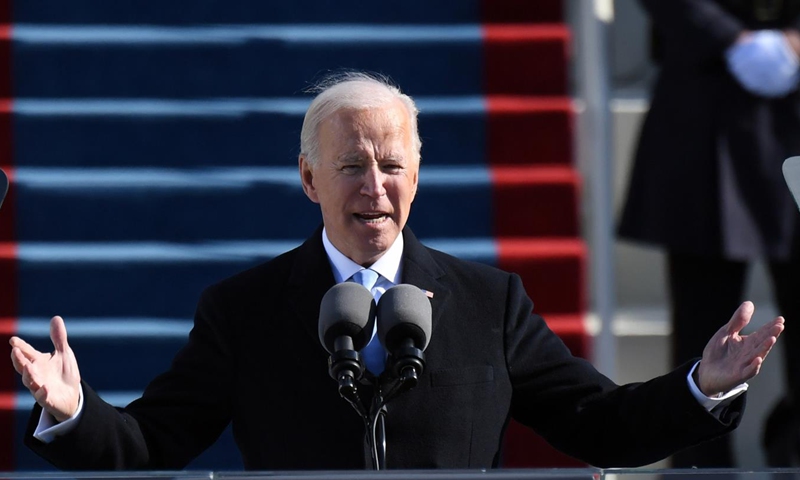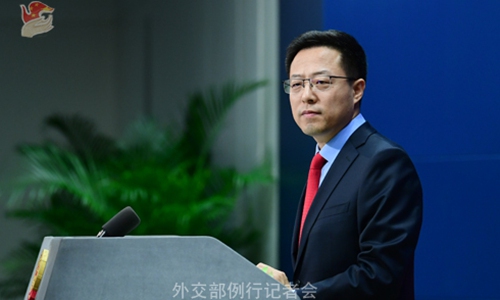
US President Joe Biden delivers his inauguration speech on Wednesday at the US Capitol in Washington, DC. Biden was sworn in as the 46th president of the US. Photo: AFP
The Biden administration is likely to continue its predecessor's Indo-Pacific strategy with containing China at its core, analysts said, as US Defense Secretary Lloyd Austin spoke to his counterparts in Japan, Australia and India less than a week after assuming office.
Biden made his first phone call with Japanese Prime Minister Yoshihide Suga on Thursday, a day after Austin called his Indian counterpart.
Biden and Suga reportedly discussed Washington's "unwavering commitment to the defense of Japan under Article 5 of their security treaty," and the US backing include the Diaoyu Islands (which are called the Senkakus by Japan).
A day earlier, Austin held a phone call with his Indian counterpart Rajnath Singh. Austin emphasized the US commitment to the US-India Major Defense Partnership, observing that it is built upon shared values and a common interest in ensuring the Indo-Pacific region remains free and open.
It is a rare move for the defense secretary to hold the first call with India, not the secretary of state or president, Qian Feng, director of the Research Department at the National Strategy Institute at Tsinghua University, told the Global Times, noting that it shows that the Biden government is satisfied with defense cooperation with India, and will deepen cooperation on issues involving China.
On the other hand, it shows Biden gives priority to India in the alliance of the US, Japan and Australia, according to Qian.
Other observers said that those calls also further outline Biden's Indo-Pacific policies. "It's not hard to see that Biden is trying to woo US partners in the Indo-Pacific region by sending goodwill signals. Those signals carried a clear message that joining hands with partners in this region to counter China will still be a major goal of Biden's Indo-Pacific policy," Li Haidong, a professor at the Institute of International Relations of China Foreign Affairs University, told the Global Times.
He said that former US president Donald Trump favored a "head-to-head" strategy in dealing with China in this region, which always featured "bluffing" military drills and direct antagonism. Biden will emphasize ties more on an ideological level to coordinate with partners, such as Japan and Indian, to contain China's rise.
"The core of the US' Indo-Pacific strategy is to kick off an all-round strategic competition with China. We should have a clear picture of it," said Li.
Within 10 days before Trump stepped down, the Trump administration took a rare move by declassifying a strategic framework for the Indo-Pacific, which was not due for public release until 2043.
Chinese observers said this rare move sent a clear signal that the Trump administration hoped its Indo-Pacific policies would be inherited by Biden, and that Biden isn't likely to deviate from the current US policy in the Indo-Pacific region.
When asked to comment on Biden and Suga's call, which mentioned the Diaoyu Islands, Zhao Lijian, spokesperson of China's Ministry of Foreign Affairs, said on Thursday that the islands are Chinese territory.
"The US-Japan security treaty is a product of the Cold War. It should not jeopardize the interests of a third party, nor should it put regional peace and stability in risk," said Zhao.
Although calls from Biden and Austin were warmly welcomed by their counterparts in Japan and India, Chinese experts are skeptical that countries in this region, including Japan and India, would form real strong partnerships with the US. Wang Yiwei, director of the institute of international affairs at Renmin University of China, said that those countries "all have their own axes to grind."
Those countries, after years of cooperation with the US, are familiar with the US diplomatic goal of prioritizing itself, so they will be careful not to fall into the US trap when dealing with major diplomatic issues, said Wang.
The Renmin University expert also said that the confidence of those allies in US leadership was shaken after witnessing the current chaotic scene and divided political system within the US. "Moreover, seeing that US meddling is destroying regions such as the Middle East, they are cautious about siding with the US and an all-round confrontation with China. Regional stability matters to all of them," said Wang.



